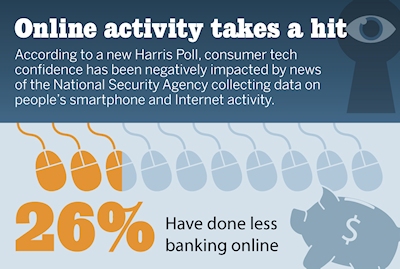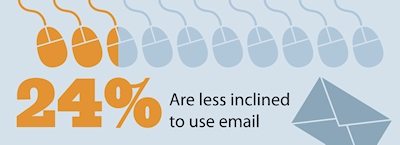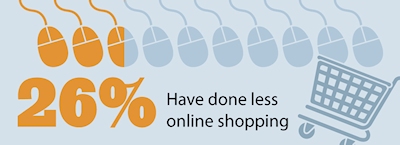Online banking and shopping in America are being negatively impacted by ongoing revelations about the National Security Agency’s digital surveillance activities. That is the clear implication of a recent ESET-commissioned Harris poll which asked more than 2,000 U.S. adults ages 18 and older whether or not, given the news about the NSA's activities, they have changed their approach to online activity.
Almost half of respondents (47%) said that they have changed their online behavior and think more carefully about where they go, what they say, and what they do online.
 When it comes to specific Internet activities, such as email or online banking, this change in behavior translates into a worrying trend for the online economy: over one quarter of respondents (26%) said that, based on what they have learned about secret government surveillance, they are now doing less banking online and less online shopping. This shift in behavior is not good news for companies that rely on sustained or increased use of the Internet for their business model.
When it comes to specific Internet activities, such as email or online banking, this change in behavior translates into a worrying trend for the online economy: over one quarter of respondents (26%) said that, based on what they have learned about secret government surveillance, they are now doing less banking online and less online shopping. This shift in behavior is not good news for companies that rely on sustained or increased use of the Internet for their business model.
Online commerce shrinkage?
After 20 years of seemingly limitless expansion of Internet commerce, these poll numbers may come as something of a shock to online firms, but they were not a complete surprise to ESET researchers. Last fall we detected early signs of this phenomenon when we conducted a smaller survey of “post-Snowden” attitudes. Some respondents reported reduced online shopping and banking behavior (14% and 19% respectively). At that time it was reasonable to speculate that such changes in behavior might be a temporary blip, but our latest findings suggest otherwise. And the reasons are not hard to find: continued revelations from the Snowden documents and a lack of convincing reassurances from government about privacy protections.
The news for online stores and financial services does not get any better when you dig deeper into the numbers. The economically important 18-34 age group are more likely to say they are doing less shopping online (33% compared to an overall 26%). Online retailers who rely more on female shoppers should note that 29% of women surveyed said they have reduced how much they shop online (compared to 23% of men and 26% overall). When it comes to banking online 29% of folks in that 18-34 age bracket had cut back, as had 30% of those aged 65 and older.
 Clearly, these findings will be of concern to the retail and financial services sectors, but the news is also bad for just about any sector of the American economy where replacing physical contact with electronic communication is part of the business model.
Clearly, these findings will be of concern to the retail and financial services sectors, but the news is also bad for just about any sector of the American economy where replacing physical contact with electronic communication is part of the business model.
Just under one-quarter of respondents (24%) said that, based on what they have learned about secret government surveillance, they are less inclined to use email. Important economic sectors ranging from healthcare to education and government are looking at expanded use of electronic communications as a way to cut costs and improve service levels. Those objectives could be harder to attain if a significant percentage of the public is less inclined to use those channels. We observed a higher than average contraction in email use in the 18-34 age group (32%) and in households where annual household income is under $50,000.
Ongoing impact of privacy intrusions
As a recent New York Times article titled “Revelations of N.S.A. Spying Cost U.S. Tech Companies” observed: “It is impossible to see now the full economic ramifications of the spying disclosures.” However, I think that when you look at this new survey and our previous research it is clear that changes in online behavior have already taken place, changes with broad economic ramifications.
 Whether or not we have seen the full extent of the public’s reaction to state-sponsored mass surveillance is hard to predict, but based on this survey and the one we did last year, I would say that, if the NSA revelations continue--and I am sure they will--and if government reassurances fail to impress the public, then it is possible that the trends in behavior we are seeing right now will continue. For example, I do not see many people finding reassurance in President Obama’s recently announced plan to transfer the storage of millions of telephone records from the government to private phone companies. As we will document in our next installment of survey findings, data gathering by companies is even more of a privacy concern for some Americans than government surveillance.
Whether or not we have seen the full extent of the public’s reaction to state-sponsored mass surveillance is hard to predict, but based on this survey and the one we did last year, I would say that, if the NSA revelations continue--and I am sure they will--and if government reassurances fail to impress the public, then it is possible that the trends in behavior we are seeing right now will continue. For example, I do not see many people finding reassurance in President Obama’s recently announced plan to transfer the storage of millions of telephone records from the government to private phone companies. As we will document in our next installment of survey findings, data gathering by companies is even more of a privacy concern for some Americans than government surveillance.
And in case anyone is tempted to think that this is a narrow issue of concern only to news junkies and security geeks, let me be clear: according to this latest survey, 85% of adult Americans are now at least somewhat familiar with the news about secret government surveillance of private citizens’ phone calls, emails, online activity, and so on. As to what should be done about this situation and its effects on commerce, privacy, and online behavior, I will have more findings to share in my next blog post, along with suggested strategies for companies who may be impacted.
Survey Methodology: The survey was conducted online within the United States by Harris Poll on behalf of ESET from February 4-6, 2014 among 2,034 U.S. adult adults ages 18 and older, among which 1,691 are at least somewhat familiar with the NSA revelations. This online survey is not based on a probability sample and therefore no estimate of theoretical sampling error can be calculated. For complete survey methodology, including weighting variables, please contact esetpr@schwartzmsl.com




